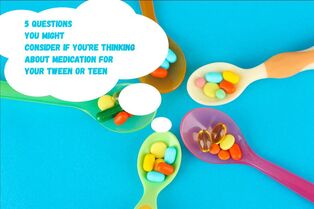 By Jean Gauvin PhD, MD 1. What is the rate of mental disorders in children and teenagers? According to the National Institute of Mental Health, up to 50% of children and adolescents meet criteria for a mental disorder in the diagnostic and statistical manual (DSM) by age 18. That means that up to half of children and adolescents are struggling significantly with emotional issues to the point that they are suffering and have impaired functioning. Medication is often used to help relieve the suffering caused by mental illnesses and disorders by targeting chemical imbalances in the brain. 2. How do you determine whether to prescribe medication? Several factors are taken into consideration when determining whether a dose of medication is appropriate. These include but are not limited to a patient’s symptoms, his or her age, sometimes his or her gender, possible interactions with other medications that he or she is also taking, the duration of treatment, as well as potential side effects. This is especially important since some psychiatric medications can have more severe long–term side effects. For example, antipsychotics and mood stabilizers can cause obesity, high cholesterol, and diabetes. These side effects, in turn, can lead to blockages in the arteries that increase the risk of heart disease and stroke. 3. Are there any child-specific considerations that factor into the decision to prescribe a medication? Whether it comes to treatment for an adult or a child, the prescribing of medication generally occurs when the benefits outweigh the risks. However, in children, there is an added subtle risk that may be difficult to accurately assess: the risk on the developing brain. Though all of our medications are tested and proven to be generally safe, we are never exactly sure what subtle effects they may have on the developing brain of a child. There is not a reliable way to determine exactly what kinds of subtle effects they may have over, let's say, twenty years on factors such as personality or cognitive development. That is why I adhere to a conservative approach in the treatment of all patients, but especially when it comes to the treatment of children. 4. Is there ever a risk to delaying or avoiding treatment with medication?
It’s important to realize that a holistic approach to psychiatric treatment often involves talk therapy. While therapy provides beneficial results, when symptoms are above a certain threshold, therapy alone is insufficient and delaying or avoiding treatment with medication carries risk also. At that point, it usually makes sense to accept the possible risks of medications to avoid the relatively certain negative outcomes of psychiatric illness. 5. How can I expect my child to respond to medication? Medications in general, and psychiatric medications specifically, usually have one of three effects. 1. The symptom in question goes away entirely. 2. The symptom gets better but is still present. 3. There is no effect. The reality is that for most children struggling with emotional difficulties medication will take the edge off but not erase symptoms. One of the goals is to reduce suffering in the moment, using medications to reduce symptoms. But I also try to assess how the current symptoms are affecting the child's development. For instance, if levels of anxiety, depression, or attention problems are preventing the child from developing healthy relationships with parents and teachers, or if the symptoms are preventing appropriate social interactions with peers, I am much more likely to use medication. On the other hand, even if a child is experiencing psychiatric symptoms, if their development seems to be on track, I would be less likely to use medication. Throughout treatment, I incorporate psychotherapy with sensitivity and compassion, with the aim toward maximizing successful biopsychosocial development. Comments are closed.
|
Categories
All
Archives
March 2023
|
[email protected]

 RSS Feed
RSS Feed